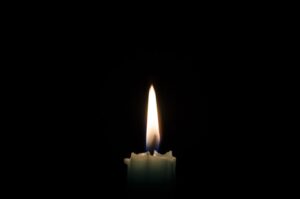In the dead of night, troops stormed into a small town in Judea and with clinical precision and evil intent, slaughtered children. When it was all over, there was nothing but the wailing of mothers and fathers and siblings stunned by the speed and sheer brutality of this murderous raid.
Perhaps you’re thinking I’m talking about recent history, but I’m not. The scene I described happened more than 2,000 years ago in Bethlehem, just after the birth of a Jewish baby named Jesus.
The Gospel of Matthew tells us this often glossed-over detail of the Nativity. It is a part of the Christmas story that doesn’t make it into sweet Christmas pageants. There are no singing angels, or lowly shepherds, or exotic kings from the East. There was only the sickening stench of death. It’s not hard to understand why this is not the stuff of Christmas Eve Lessons and Carols.
No, for us, Christmas is all about happy things. Jolly Santas. Family gatherings. Singing Silent Night in a church lit by candlelight. We thrill to the triumphant strains of Joy to the World.
And yet from the first, death cast its shadow over Jesus. His very existence threatened the religious and secular leaders of the day. Like his ancestors in Egypt who painted their doorposts as a sign, he was spared death that night. Of course, death would come to him, but not then. Not yet.
This is how Matthew describes it in Chapter 2 of his gospel:
“When Herod realized that he had been outwitted by the Magi, he was furious, and he gave orders to kill all the boys in Bethlehem and its vicinity who were two years old and under, in accordance with the time he had learned from the Magi. Then what was said through the prophet Jeremiah was fulfilled:
“A voice is heard in Ramah,
weeping and great mourning,
Rachel weeping for her children
and refusing to be comforted,
because they are no more.”
This has become known as the Slaughter of the Innocents, and I have been thinking a lot about it lately. Not far from where it first took place, today hundreds of Rachels weep for their children because they are no more.
Matthew is the only gospel writer who included this story of death intruding on the joy of birth. I’m glad he did. This story of mass murder tugs at our sleeves and says, “Pay attention. Look away for a moment from the beautiful lights and serene creches and see humanity’s darkest impulses. Look at people’s capacity for every kind of depravity. This is why we need saving.” This story kicks over the rock and reveals that just beneath the surface of “civilization” is swarming, unimaginable evil.
This story is an example that faith shows us the world as it really is. Believers are often mocked as silly Pollyannas who trade the “real world” for pious, pie-in-the-sky fantasies of angels and clouds and “everything happens for a reason.” (And to be fair, some Christians do sound like that). But what I see when I study Scripture and read great theologians and even talk to “ordinary” believers is the opposite. They see the world for what it is: beautiful and terrible, full of grace and venom, reflecting the image of God and of The Enemy. And yet, in recognizing the fallen state of our world, there is never resignation. There is still an impulse to bring more beauty, more justice, more reconciliation to the world, even as we acknowledge we will never succeed completely.
Advent is the time when Christians wait for a savior because they know they need one.
Jesus was born into a world where darkness was never far from him. That shadow followed him all his days on earth, and at the last, it seemed to have the final word. Lately, it still seems that way, when the airways and Internet are full of horror and death, death, death. In our own lives, shadows of illness, loss, and rancor threaten to overwhelm .
But that shadow did not — it does not —block out the light of His life. Jesus escaped death that day as an infant. And He escaped it again as an adult when the grave could not hold him.
“In him was life, and the life was the light of men. The light shines in the darkness, and the darkness has not overcome it.”
John 1:5
This Advent I need to hang on to that in a way I never have before. I’m resolving to “cast off the works of darkness and put on the armor of light .”(Romans 13:12) How about you?


Thank you Laura. This is great. I love Romans 13:12. Certainly a most valuable scripture for all of us as this world has so much darkness.
Just what I needed to read today, Laura.
Thanks for this insight and hope. Christ-filled blessings to you
I feel this way about Hanukkah, which Jesus celebrated in darker times than these. We know that our ancestors succeeded, with God’s help, in conquering evil and restoring light to the world. Yet there are days when candles, prayers, and songs seem like the weakest of weapons for such a battle. The strength is in our faith and our willingness to do what is right, even when the world is against us.